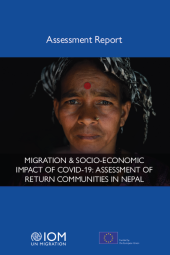Migration and Socio-economic Impact of Covid 19 Assessment of Return Communities in Nepal
Summary
This is an assessment paper that examines the impact of COVID-19 on return communities in Nepal, focusing on migration and socio-economic factors. The analysis includes the patterns of return migration, with a significant number of returnees from India and Gulf Countries who were previously employed in service and manufacturing sectors. The assessment highlights the challenges related to social protection and basic services, including the lack of information on government-provided healthcare and COVID-19 measures, as well as the government's shortcomings in reintegrating and rehabilitating returnees. Regarding economic response and recovery, the study reveals that factors such as a lack of alternative income sources, limited awareness of job opportunities, and insufficient skills training have led to unemployment, prompting Nepali migrants to seek employment in other countries. In terms of macroeconomic response and multilateral collaboration, the paper underscores the threat to the daily income and increased vulnerability of return migrants and their communities due to job losses and a lack of government support. They often rely on savings and remittances from family members abroad for their livelihoods. Lastly, the assessment of social cohesion and community resilience indicates that return migrants face various challenges, including stigma, discrimination, incidents of verbal abuse upon their return, etc.
Categories:
Report
Publisher:
International Organization for Migration
Published Year:
2021
